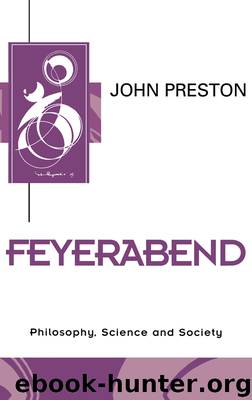Feyerabend by John Preston

Author:John Preston
Language: eng
Format: epub
Publisher: Wiley
According to the Pragmatic Theory of Observation, ‘p’ is an observation-statement if and only if a well-conditioned and appropriately prompted observer who is situated in front of an appropriate object will respond to interrogation with ‘p’. This, a behaviouristic substitute for the characterization embedded in the rival ‘Semantic Theory of Observation’, is an attempt to bypass the semantic aspects of observation-statements (which are, in the case of incommensurable theories, incomparable, and therefore cannot afford a basis for tests) in favour of their causal or pragmatic features. And, as I suggested in chapter 3, it is an attempt to see human observers as measuring-instruments.
A test of a theory is, according to this conception, a matter of comparing the reactions of the suitably programmed observer with the ‘reactions’ of the theory itself, the sentences which it predicts. The theory passes the test if and only if its deliverances successfully mimic those of the observer. The meanings of the predicted observation-sentences do not enter into the test procedure, since it is sentences and not statements which are compared. Thus this test procedure is adjudged to afford a means of comparing the virtues of even the most radically incommensurable theories.
This suggestion has come under plenty of fire.10 Shapere conducted a sustained attack on the idea that the Pragmatic Theory of Observation could help us decide between rival theories of any kind. The gist of his critique is that, since uninterpreted observation-statements convey no information at all, they ‘cannot convey information which would serve as a basis for “removing” a theory’ (Shapere 1966, p. 48). Feyerabend suggests that ‘an acceptable theory . . . has an inbuilt syntactical machinery that imitates (but does not describe) certain features of our experience’ ([1965a], pp. 214–15). But why should such mimicking constitute a virtue of a theory? Without semantic content, observation-sentences seem to have no properties in virtue of which they are relevant, either positively or negatively, to the acceptability of theories.
2 The second criterion of theory-choice suggested by Feyerabend is also a substitute for the crucial experiment. The suggestion is that we ‘confirm one of two incompatible theories. If the confirmed theory and its rival are strong alternatives, then the rival will have to go’ ([1965c]: PP1, p. 116). We have already seen that ‘strong alternative’ theories are not incommensurable, since they contradict each other over the truth-value of some observation-statement. But forgetting the parenthetical requirement that the two be strong alternatives, and concentrating on merely incommensurable theories, this suggestion seems acceptable. Everything depends upon the process of confirmation. Theory-comparison can only work along these lines if we have a measure of confirmation which is common to the theories. Such a measure will be purely syntactic. Harold Brown, a commentator sympathetic to Feyerabend, has noted that
[i]t is one of the intriguing ironies of recent discussions in the philosophy of science that logical empiricists, who are among the most vociferous critics of the incommensurability thesis, have also sought purely syntactic confirmation theories as the ideal tool for theory comparison.
Download
This site does not store any files on its server. We only index and link to content provided by other sites. Please contact the content providers to delete copyright contents if any and email us, we'll remove relevant links or contents immediately.
Enlightenment Now: The Case for Reason, Science, Humanism, and Progress by Steven Pinker(7313)
A Journey Through Charms and Defence Against the Dark Arts (Harry Potter: A Journey Through…) by Pottermore Publishing(4811)
The Immortal Life of Henrietta Lacks by Rebecca Skloot(4588)
A Journey Through Divination and Astronomy by Publishing Pottermore(4385)
Elon Musk by Ashlee Vance(4127)
Origin Story: A Big History of Everything by David Christian(3692)
COSMOS by Carl Sagan(3625)
Alchemy and Alchemists by C. J. S. Thompson(3521)
Bad Pharma by Ben Goldacre(3428)
Enlightenment Now by Steven Pinker(3369)
Shadow of Night by Deborah Harkness(3368)
Inferior by Angela Saini(3314)
A Mind For Numbers: How to Excel at Math and Science (Even If You Flunked Algebra) by Barbara Oakley(3307)
Origin Story by David Christian(3201)
The Code Book by Simon Singh(3189)
Signature in the Cell: DNA and the Evidence for Intelligent Design by Stephen C. Meyer(3138)
The Elements by Theodore Gray(3057)
A Brief History of Time by Stephen Hawking(3024)
A Journey Through Potions and Herbology (A Journey Through…) by Pottermore Publishing(2852)
